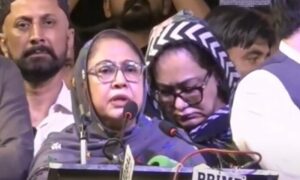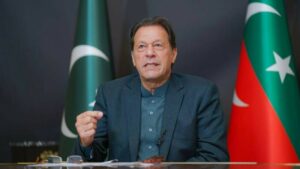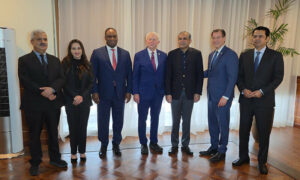Pakistan has invited Indian Prime Minister Narendra Modi for the meeting of the council of heads of Shanghai Cooperation Organisation (SCO). The two-day meeting will be held in Islamabad on October 15 and 16. Some wonder why Pakistan sent Modi an invitation when he is hell bent upon isolating Islamabad. They, perhaps, are not aware that sending an invite to Modi is a compulsion and not an option. SCO rules and protocols are clear that the host nation has to invite all member states irrespective of their bilateral ties. That was the reason that India, as chair of the SCO in 2023, invited Pakistan in all meetings of the groupings. Former Foreign Minister Bilawal Bhutto Zardari had travelled to Goa, India for the meeting of SCO foreign ministers in May 2023. Shehbaz Sharif was also invited to the SCO summit held in July in New Delhi.
However, the question now is: will Modi travel to Pakistan in October? The chances are slim. The reasons are twofold. First, India, under Modi, has been following a policy of isolating Pakistan. Attending the SCO summit in Pakistan will not be in line with India’s current strategy. The other factor is the SCO forum itself. India and Pakistan became full members of the China- and Russia-dominated Eurasian regional alliance in 2017 but New Delhi of late tried to maintain a distance from SCO, which is not seen positively in the West. Modi skipped the last two meetings of the council of heads of government and heads of states, suggesting India’s changing priorities. India feels that SCO is a forum that is focused on advancing China’s interests. Because of these factors, it would be a surprise if Modi shows up at the SCO meeting in Islamabad.
The Indo-Pak relations have been frozen since 2016. There was a further dip in August 2019 when India unilaterally revoked the special status of the disputed Jammu and Kashmir region. There were efforts, through backchannels in the past, to resurrect the relationship. However, the positions of the two countries are so divergent, diminishing any prospects of a thaw. India has been following a carefully crafted policy to maintain a status quo – meaning no dialogue, no engagement with Pakistan. New Delhi feels that it can sustain this approach. However, there are people in India, maybe in minority, who feel that this policy is not tenable. Proponents of seeking engagement with Pakistan think that China is a real threat for India. Indian strategic thinkers often fear the two-front situation – facing China and Pakistan at the same time. Those who favour dialogue with Pakistan are adamant that pursuing engagement with Islamabad can neutralise that potential two-front situation.
Indian External Affairs Minister S Jaishankar, who is considered a hardliner on Pakistan, recently hinted at a potential shift in India’s policy towards Islamabad.
At the launch of a book in New Delhi, the Indian top diplomat explained the Modi government’s current policy on Pakistan. “I think the era of uninterrupted dialogue with Pakistan is over. Actions have consequences, and in so far as Jammu & Kashmir is concerned, (Article) 370 is done. So, the issue today is what kind of relationship can we possibly contemplate with Pakistan What I do want to say is that we are not passive, and whether events take a positive or negative direction, either way we will react.”
If one reads Jaishankar’s statement carefully, it does signal a shift in India’s approach. It seems that after a long time, New Delhi is hinting at reciprocating potential peace overtures from Pakistan. Previously, India, under Modi, always responded to questions of a thaw in ties with disdain. But Jaishankar’s remarks suggest that India is open to the idea of positive engagement with Pakistan. The two countries have a complex relationship rooted in shared and checkered history. Talking about the positives, if Modi’s visit to Pakistan is difficult, at least the Indian government can allow its cricket team to travel to Pakistan for the ICC Champions Trophy next year. That could be a good starting point, at least to lower some tensions.











